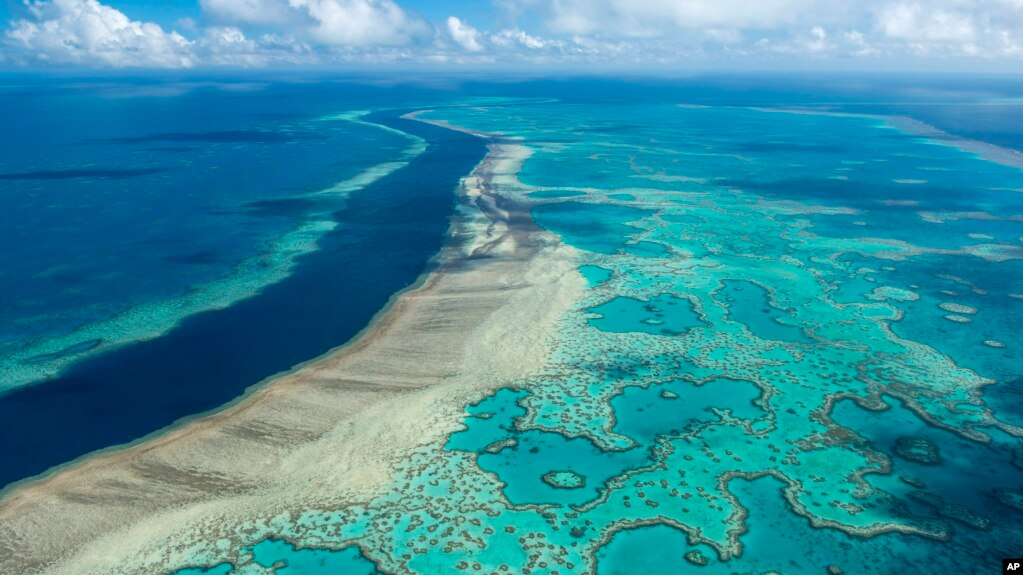Study: Hottest Oceans in 400 Years Endanger Great Barrier Reef
Study: Hottest Oceans in 400 Years Endanger Great Barrier Reef
今回は、オーストラリアのグレートバリアリーフに関する最新の研究です。ここ10年で周辺の海水温がこの400年で最も高くなり、大規模なサンゴの白化が繰り返されています。記事に出てくる「threat」は「脅威」という意味で、a threat to health(健康への脅威) や a threat to wildlife(野生動物への脅威) のように使われます。世界最大のサンゴ礁が失われれば、自然環境だけでなく観光や地域経済にも影響します。そんなサンゴ礁や海を守るために、私たちが日常の中でできることにはどんなことがあるでしょうか?講師と話してみましょう。

1.Article
Directions: Read the following article aloud.
New research shows that water temperatures in and around Australia's Great Barrier Reef have risen to their warmest in 400 years over the past 10 years. The rising temperatures have put the world's largest reef under threat.
The Great Barrier Reef is the world's largest living ecosystem. It stretches for 2,400 kilometers off the coast of the northern state of Queensland.
A group of scientists at universities across Australia removed core samples from the coral. They examined the samples to measure summer ocean temperatures going back to the year 1618. The scientists combined information from core samples with ship and satellite data going back around 100 years.
The results show that ocean temperatures were unchanged for hundreds of years. But starting in 1900, the ocean temperatures began to rise. The research found that this is the result of human influence.
From 1960 to 2024, the study’s writers observed an average yearly warming for January to March of 0.12 degrees Celsius per decade.
Since 2016, the reef has experienced five summers of mass coral bleaching. This is when large parts of the reef turn white due to heat stress. This also puts the coral at greater risk of death. The mass bleaching events happened during five of the six warmest years in the last four centuries, the study showed.
This research appeared on August 8 in the publication Nature.
"The world is losing one of its icons," said Benjamin Henley. He is with the University of Melbourne and is one of the study's co-writers.
"I find that to be an absolute tragedy. It's hard to understand how that can happen on our watch in our lifetime. So it's very sad,” Henley added.
The last temperature measurement, from January to March of this year, was the highest on record. Henley added that it was "head and shoulders" above any other year, meaning it was much higher.
Coral reefs are important for many reasons. They protect shorelines from erosion. They are home to thousands of kinds of fish. And they are an important part of the tourism industry in many countries. In Australia, the Great Barrier Reef adds $4.2 billion to the economy each year.
At least 54 countries and areas have experienced mass bleaching of their reefs since February 2023, as climate change warms the ocean's surface waters. That information comes from the U.S. National Oceanic and Atmospheric Administration.
The Great Barrier Reef is the world's largest living ecosystem. It stretches for 2,400 kilometers off the coast of the northern state of Queensland.
A group of scientists at universities across Australia removed core samples from the coral. They examined the samples to measure summer ocean temperatures going back to the year 1618. The scientists combined information from core samples with ship and satellite data going back around 100 years.
The results show that ocean temperatures were unchanged for hundreds of years. But starting in 1900, the ocean temperatures began to rise. The research found that this is the result of human influence.
From 1960 to 2024, the study’s writers observed an average yearly warming for January to March of 0.12 degrees Celsius per decade.
Since 2016, the reef has experienced five summers of mass coral bleaching. This is when large parts of the reef turn white due to heat stress. This also puts the coral at greater risk of death. The mass bleaching events happened during five of the six warmest years in the last four centuries, the study showed.
This research appeared on August 8 in the publication Nature.
"The world is losing one of its icons," said Benjamin Henley. He is with the University of Melbourne and is one of the study's co-writers.
"I find that to be an absolute tragedy. It's hard to understand how that can happen on our watch in our lifetime. So it's very sad,” Henley added.
The last temperature measurement, from January to March of this year, was the highest on record. Henley added that it was "head and shoulders" above any other year, meaning it was much higher.
Coral reefs are important for many reasons. They protect shorelines from erosion. They are home to thousands of kinds of fish. And they are an important part of the tourism industry in many countries. In Australia, the Great Barrier Reef adds $4.2 billion to the economy each year.
At least 54 countries and areas have experienced mass bleaching of their reefs since February 2023, as climate change warms the ocean's surface waters. That information comes from the U.S. National Oceanic and Atmospheric Administration.
Alasdair Pal reported this story for Reuters News Agency from Sydney, Australia. Anna Matteo adapted it for VOA Learning English.
Source:Study: Hottest Oceans in 400 Years Endanger Great Barrier Reef
VOA
本教材は、the U.S. Agency for Global Mediaより許諾を得て、産経ヒューマンラーニング株式会社が編集しています。
テキストの無断転載・無断使用を固く禁じます 。
